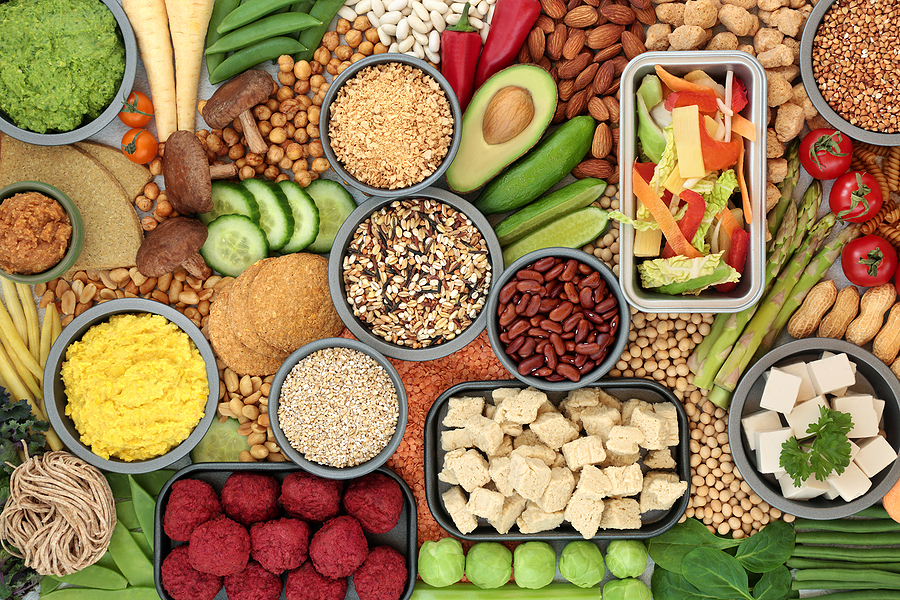All About Healthy Food: Advantages of Taking On Plant Based Choices
The conversation bordering plant-based diet plans has actually gotten significant attention recently. Numerous individuals are exploring the potential wellness benefits, dietary benefits, and environmental impacts related to these dietary selections. As people become more knowledgeable about their food's influence on well-being and sustainability, inquiries develop regarding the usefulness of taking on such a lifestyle. What certain changes can one anticipate, and just how might these choices reshape not only individual health however likewise the earth's future?
Understanding Plant-Based Diet Plans
Although many individuals connect plant-based diet plans generally with vegetarianism or veganism, these diet regimens can include a vast variety of consuming patterns that prioritize entire, minimally refined plant foods. Such diet plans usually include fruits, veggies, whole grains, seeds, vegetables, and nuts, while eliminating or limiting animal items. This flexibility permits people to tailor their dietary choices according to dietary needs and personal preferences. Some may take on a mostly plant-based diet plan while still sometimes consuming meat or milk, usually referred to as a flexitarian strategy. The focus stays on including even more plant foods, which can lead to a diverse range of meals and flavors. Recognizing these numerous interpretations of plant-based eating is vital for appreciating its ease of access and appeal in contemporary food society.
Wellness Benefits of Plant-Based Foods
The health and wellness benefits of plant-based foods are significant, offering a nutrient density advantage that sustains total wellness. Study indicates that these foods can enhance heart health and wellness and play a crucial role in reliable weight management. By integrating much more plant-based alternatives, people may enhance their dietary selections and advertise lasting wellness.
Nutrient Thickness Benefit
Nutrient density plays a crucial function in the health and wellness benefits of plant-based foods, making them a compelling choice for those seeking a balanced diet regimen. Plant-based foods, such as fruits, veggies, vegetables, nuts, and entire grains, are often abundant in essential vitamins, minerals, and antioxidants while being lower in calories. This high nutrient thickness enables individuals to eat fewer calories while still meeting their dietary requirements. Furthermore, these foods are packed with dietary fiber, advertising digestive health and aiding in weight monitoring. By integrating nutrient-dense plant-based options, customers can improve their overall wellness, sustain their immune systems, and lower the danger of chronic conditions. Eventually, the nutrient density of plant-based foods emphasizes their significance in a health-conscious lifestyle.
Heart Health And Wellness Improvement

Weight Administration Support
In addition to advertising heart wellness, a plant-based diet can considerably aid in weight monitoring. This dietary approach highlights entire foods such as fruits, vegetables, legumes, nuts, and entire grains, which are generally reduced in calories and greater in fiber compared to animal-based items. The high fiber content aids enhance satiety, lowering general calorie consumption. Plant-based diet plans are typically abundant in vital nutrients while reduced in unhealthy fats, making it much easier to preserve a healthy and balanced weight. Research indicates that people who take on a plant-based lifestyle have a tendency to have reduced body mass indexes (BMIs) and experience more successful weight loss compared to those who take in meat-heavy diets. Embracing plant-based choices is a calculated choice for effective weight monitoring.
Nutritional Value of Plant-Based Components
Plant-based components are abundant in essential nutrients, providing a diverse range of vitamins, minerals, and antioxidants that add to general health and wellness. A contrast of healthy protein sources exposes that while animal products are commonly deemed exceptional, lots of plant-based choices supply appropriate protein and other useful compounds. Comprehending the nutritional worth of these active ingredients can aid people make notified dietary choices.
Necessary Nutrients in Plants
Nutrient-rich components discovered in plants provide a diverse variety of crucial vitamins and minerals that add considerably to general health and wellness. These ingredients are abundant in vitamins A, C, and K, which sustain immune feature, vision, and blood clotting, specifically. Furthermore, plants supply essential minerals such as magnesium, calcium, and potassium, vital browse around here for heart health and wellness, muscle feature, and bone toughness. The visibility of fiber in plant-based foods aids food digestion and promotes a healthy and balanced gut microbiome. Antioxidants, discovered generously in fruits and vegetables, assistance battle oxidative anxiety and decrease swelling. Additionally, numerous plant foods are reduced in calories yet high in nutrients, making them an outstanding selection for those seeking to preserve a healthy weight while guaranteeing suitable nutrient intake.
Contrasting Healthy Protein Resources
Healthy protein sources vary considerably in their nutritional profiles, with plant-based active ingredients offering one-of-a-kind benefits. try these out Unlike pet healthy proteins, which usually have hydrogenated fats and cholesterol, plant proteins have a tendency to be lower in these unhealthy parts. Legumes, nuts, seeds, and entire grains are rich in crucial amino acids, fiber, vitamins, and minerals. For example, lentils provide high healthy protein material alongside significant iron and folate, while quinoa is a full healthy protein, providing all 9 crucial amino acids. In addition, plant-based proteins are frequently gone along with by antioxidants and phytochemicals that sustain overall wellness. The shift to plant-based protein resources not only improves nutritional intake however additionally lines up with lasting nutritional techniques, decreasing ecological influence and promoting long-lasting health and wellness advantages.
Ecological Impact of Plant-Based Eating
As understanding of climate modification expands, numerous people are discovering sustainable nutritional selections that can significantly decrease their environmental footprint. Plant-based consuming has actually become a substantial factor to decreasing greenhouse gas discharges, which are mostly linked with animals manufacturing. The farming of fruits, veggies, grains, and legumes normally calls for fewer resources, such as water and land, compared to animal farming. Furthermore, plant-based diet regimens can result in reduced logging, as much less land is required for grazing animals or expanding pet feed. By changing towards plant-based options, consumers can support biodiversity and promote healthier environments. On the whole, embracing plant-based consuming not just advantages individual wellness but also represents a vital step toward environmental sustainability and conservation initiatives.
Conquering Common Misconceptions
While several people identify the advantages of a plant-based diet plan, a number of misconceptions frequently discourage them from fully welcoming this way of life. An usual idea is that plant-based diet plans lack adequate protein; however, countless plant resources, such as vegetables, nuts, and tofu, supply sufficient protein. Additionally, some assume that this diet is pricey, when as a matter of fact, staples like beans, rice, and seasonal veggies can be quite budget friendly. An additional mistaken belief is that plant-based eating is overly limiting, whereas it really provides a varied variety of foods and flavors. Ultimately, numerous worry that a plant-based diet regimen may lead to shortages, yet with appropriate planning, people can obtain all essential nutrients, consisting of vitamins and minerals, while enjoying a variety of scrumptious meals.
Tips for Transitioning to a Plant-Based Lifestyle
Making the change to a plant-based lifestyle can be an enhancing experience, though it frequently calls for some guidance to navigate the first changes. Individuals are encouraged to begin gradually, integrating even more fruits, veggies, legumes, and whole grains right into their dishes while reducing meat and dairy products intake. Dish planning is vital; preparing an once a week food selection can help relieve the adjustment and protect against last-minute unhealthy options. Discovering cooking methods and new recipes can likewise keep and boost the experience excitement about plant-based eating. Furthermore, joining support system or areas can give motivation and share valuable tips. Remaining educated concerning nourishment assurances balanced meals, avoiding shortages while cultivating a healthy and balanced, gratifying plant-based way of life.

Delicious Plant-Based Meal Concepts
Exploring tasty plant-based dish concepts can inspire individuals to welcome a more healthy diet regimen. One popular choice is a passionate quinoa salad, including cherry tomatoes, cucumber, and a spicy lemon-tahini dressing. An additional fave is a mouthwatering lentil stew, packed with carrots, celery, and aromatic herbs, best for a calming dinner. For breakfast, overnight oats made with almond milk, chia seeds, and topped with fresh berries supply a nourishing start to the day. Additionally, a lively veggie stir-fry with tofu and a selection of vivid veggies can be a fast yet satisfying meal. Finally, velvety avocado toast on whole-grain bread, sprayed with seeds and seasonings, supplies a simple yet tasty snack. These dishes display the selection and splendor of plant-based consuming.

Often Asked Questions
Can a Plant-Based Diet Regimen Supply Enough Healthy Protein?
The concern of whether a plant-based diet can supply sufficient healthy protein is typical. Numerous resources, including beans, nuts, seeds, and whole grains, can fulfill healthy protein needs successfully, supporting a well balanced and nourishing diet plan for people.
Are Plant-Based Diet Plans Ideal for Children?
The viability of plant-based diets for youngsters depends on mindful planning. Appropriate nutrients must be ensured, including vitamins, minerals, and healthy proteins. With correct guidance, such diet plans can sustain healthy and balanced growth and growth in kids.
Just how Do I Dine Out on a Plant-Based Diet plan?
Eating in about his restaurants on a plant-based diet entails looking for restaurants with varied food selections, asking for adjustments, and discovering vegan-friendly options. Planning in advance and connecting dietary preferences can improve the eating experience while keeping dietary choices.
What Are Typical Irritants in Plant-Based Foods?
Usual allergens in plant-based foods include soy, gluten, nuts, and seeds - BBQ Sauces. Individuals following a plant-based diet regimen should be conscious of these irritants and review tags carefully to avoid unfavorable reactions and ensure risk-free usage
Can Plant-Based Diets Assist With Weight Reduction?
Research study suggests that embracing a plant-based diet regimen might facilitate weight reduction due to its usually reduced calorie thickness and greater fiber web content. This mix can improve satiation, assisting individuals manage their caloric consumption successfully. Numerous people associate plant-based diets mainly with vegetarianism or veganism, these diet regimens can incorporate a vast variety of eating patterns that prioritize whole, minimally refined plant foods. Nutrient thickness plays a necessary function in the health and wellness benefits of plant-based foods, making them an engaging selection for those looking for a balanced diet. Plant-based diet regimens have actually been shown to noticeably boost heart wellness, as they typically include elements that sustain cardiovascular function. In enhancement to promoting heart health, a plant-based diet regimen can significantly help in weight management. An usual belief is that plant-based diets do not have sufficient healthy protein; nevertheless, various plant resources, such as vegetables, nuts, and tofu, supply sufficient healthy protein.